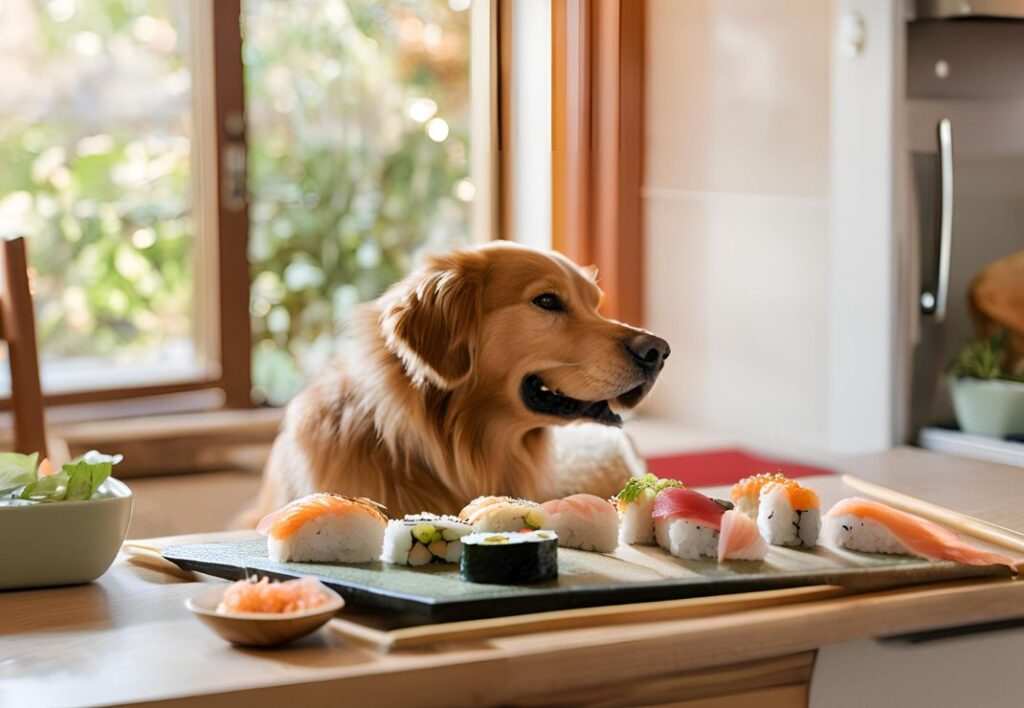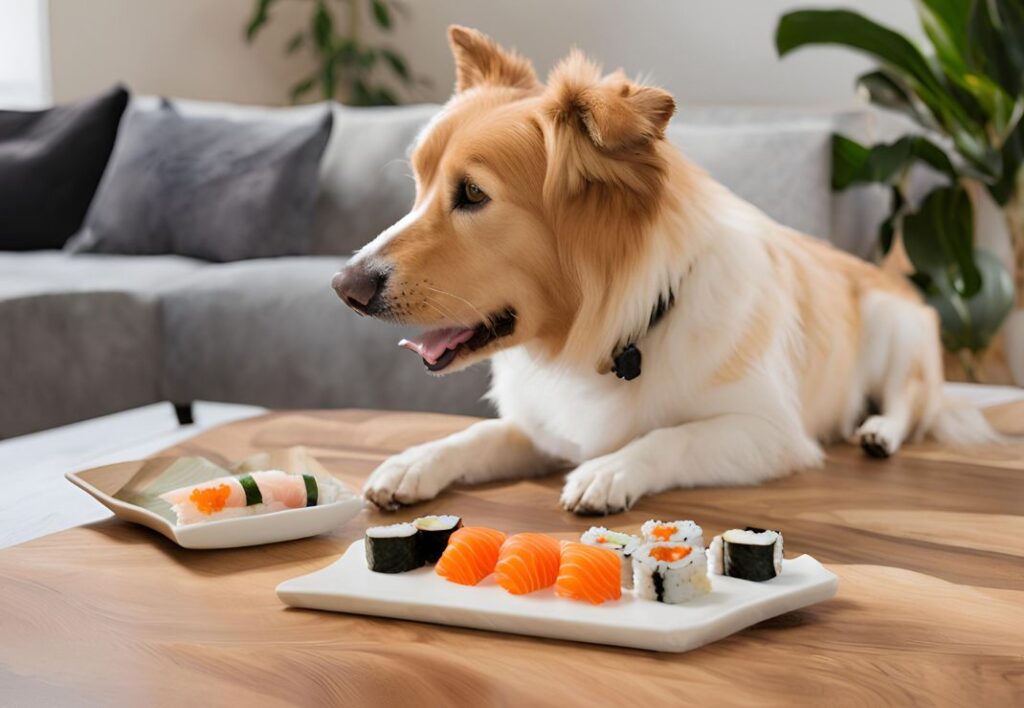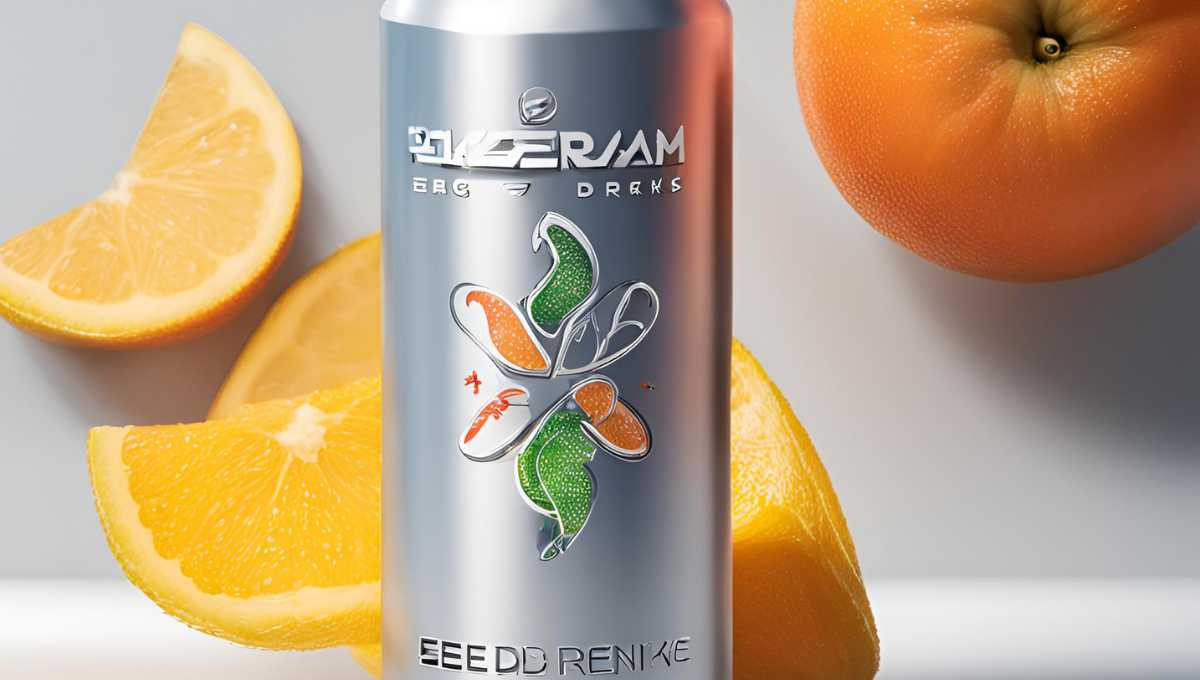
Thesis statement:Can Dogs Eat Sushi?
Sushi might have ingredients that can be beneficial to the diet of a dog, but it is also risky and unhealthy in the long term. Therefore, Can Dogs Eat Sushi: Many sushi ingredients should be kept away from dogs, and any signs of problems with the pet should be attentively monitored by its owner.
What Is Sushi?
Sushi is a dish from Japan, typically made of vinegared rice combined with a variety of ingredients, such as seafood, vegetables, and sometimes fruits. The main element is rice, which is seasoned with rice vinegar, sugar, and salt. Some types of sushi are the following:
In This Post
ToggleNigiri: this is a type of sushi that includes a small serving of rice with a topping, such as a slice of raw fish.
Sashimi: the dish consists of thinly sliced raw fish or seafood; it is served without rice.
Maki: sushi rolls with rice and other ingredients rolled in seaweed and then sliced.
Temaki: is a hand roll of sushi shaped as a cone, where seaweed is wrapped around the ingredients.
Uramaki: these are inside-out rolls, meaning that rice is on the outside of seaweed.

Can Dogs Eat Sushi?
There are fish and vegetables with benefits that can add to the diet of a dog and improve its health. However, sushi can also be risky for dogs. Even though fresh sushi gives a dog higher amounts of protein and omega-3 fatty acids and other nutrients, some of its fish and other ingredients can also be harmful, and if used in large amounts, be it even toxic to dogs. Feeding a dog with sushi should include an understanding of which ingredients they are going to consume first. Moreover, sushi should not be the pet’s main or sole food, replacing dog food.
Related: Can Dogs Have Raspberries?
Preferred Ingredients with Their Possible Negative Effects(Can Dogs Eat Sushi)
Here are some of the most popular sushi items not safe for dogs:
Avocado
The flesh is safe in low amounts, but the skin can be toxic as it contains a bacteria called persin. Wash green and remove all the fluids and wash avocados before cutting them as to avoid transferring bacteria.
Cream Cheese
Because it is so high in fat you need to watch creams cheese as it can cause obesity, weight gain and other health issues.
Mango
Dogs are allergic to mango entirely but at high points dogs get affected by fruit sugar. Birds that eat mango at one time will not be able to prevent sugar and fat gain.
Raw Fish
Dogs need to eat cooked fish because bacteria, parasites as well as worms can be present in raw fish. Parathormones are the most dangerous.
Tempura
You have possibly ever had to buy a sushi dish with tempura. Deep fried and highly fat and high in sodium,. If we eat a lot of it it can hurt us but at least sodium-ion poisoning occurs when.
Wasabi
Do not let your dogs have this as wasabi can upset their digestive system.

Signs That Your Dog Has a Bad Reaction to Sushi(Can Dogs Eat Sushi)
Lethargy, Always be on the lookout for the following: If your dog exhibits this is not an allergic reaction to seafood; call your vet if sleeping and resting more than usual.
Upset tummy, learns to feel out when your dog has nothing in the they can throw at all and hear it tummy flatulence. Call your vet if the accompanying symptoms are isolated and do not subside.
Allergic reactions
Abdominal Pain
Excessive Thirst post-infection injury or infection may cause newborns to be highly professional and to die.
If you notice any of these signs, it’s a good idea to contact your vet for advice. Usually, sushi isn’t recommended for dogs simply because they may suffer from certain symptoms like gas, stomachache, diarrhea, and vomiting, and also because it may contain food known to be bad for the dog, such as raw meat and high sodium.
How much sushi your dog can consume according to their size
The best and most appropriate portion of sushi for a human is 10-12 rolls, and it is biting-sized, which makes it a good food for humans. I mean, who wouldn’t love something so great with soy sauce. However, it’s a treat you should only give to your dog. Reduce the amount to 1 to 2 rolls and only give once a week for your dog. You don’t need to worry about giving your dog that much sushi; most people wouldn’t give them more than that anyway.
Therefore, here’s how much sushi your dog can consume according to their size;
- Extra-small dogs (2-20 lbs.): A small piece of sushi per week (for example, Yorkies, Chihuahuas, Pomeranians, Pugs)
- Small dogs (21-30 lbs.): Half a roll per week (for example, Basenjis, Beagles, Miniature Australian Shepherds)
- Medium dogs (31-50lbs.): One roll per week (for example, Basset Hounds, Border Collies, Australian Cattle Dogs, Siberian Huskies)
- Large dogs (51-90 lbs.): 1-2 rolls per week (for example, Pit Bulls, German Shepherds, Labrador Retrievers, Australian Shepherds)
- Extra-large dogs (91 + lbs.): 1-2 rolls per week (for example, Newfoundlands, Bernese Mountain Dogs, St. Bernards, Great Pyrenees)

What happens if your dog eats an unusual amount of Sushi?(Can Dogs Eat Sushi?)
If your dog eats an unusual amount of sushi, there are a few things you should watch for:
Raw Fish Concerns: Sushi always has raw fish, which could have parasites or bacteria that can make your pet sick. Most of the time, it’s a gamble, even when the fish has been specifically raised for sushi.
High sodium
Other foods that might not be ideal for dogs are sushi condiments, such as soy sauce. Too much of a high-sodium dish can cause salt poisoning in dogs as much as it can in people.
Potential toxic ingredients
Some sushi ingredients, such as avocado or specific types of fish, might be toxic to dogs. Other ingredients, such as seaweed, are unlikely to harm a dog but might cause a stomach upset,
Upset stomach
If a dog consumes an unusual amount of sushi, this might upset its stomach and cause vomiting, diarrhea, or abdominal pain. If you suspect that your dog has eaten a lot of sushi and seems unwell, take it to the vet immediately. Even if your dog does not seem to be in agony but you are still concerned, you may want to contact your vet.
How to serve these dishes to a dog(Can Dogs Eat Sushi)
Choose the appropriate ingredients:
Do not use raw fish: While some raw fish will not harm your dog, parasites may be present in some varieties. Cooked forms, such as salmon or canned tuna, are excellent examples of types of fish that are fit for dogs. And it should be unseasoned, of course.
Avoid soy sauce
Skip the wasabi because if your dog accidentally licks some up on a sushi roll, it will irritate their bodies.
Boneless and skinless ingredients
Cut into smaller pieces
Avoid additives.
This means not including extra ingredients, such as rice, or main ingredients, such as avocado, that are harmful to dogs.
Serve in Moderation: Irrespective of the fact that sushi is prepared from safe ingredients, it should not be included in a dog’s meal regularly. It is more appropriate to provide sushi to dogs only as a special or occasional treat. In addition, in case doubts as to some ingredients remain, it is better to consult a veterinarian before introducing any new products.
Alternatives to Sushi for Dogs
If one is looking for other dog-friendly products similar to sushi that dogs can be fed, there are many products they can choose from that can serve as an excellent source of nutrients and tastes enjoy.
The alternatives include:
Salmon Treats: Cooked, plain salmon could serve as a great trea.t for dogs. It is important to ensure that the fish is cooked through and does not have any bones.
Chick Jerky: Whether store-bought or homemade by cooking a plain chick, it is not only a tasty but also high-protein source.
Carrot Sticks: Tasty and low in calories, carrot sticks are also crunchy, and this is a healthy snack for dogs.Additionally, they help in the cleaning of teeth.
Dehydrated Sweet Potato Slices: Apart from being a nutritious, tasty snack, they also serve as an amazing chew for dogs.
Peanut Butter: Dogs can be fed small amounts of plain peanut butter without xylitol for the desired taste.
Cooked Pumpkin: Plain cooked pumpkin not only keeps dogs’ digestive systems in order but can be added to their meal or ingested as a treat.
Apples: Another sweet trea.t is sliced apples. Overall, remember to introduce any new treats to the dog’s meals gradually and monitor for any signs of an allergy or a problem in the digestive system.





